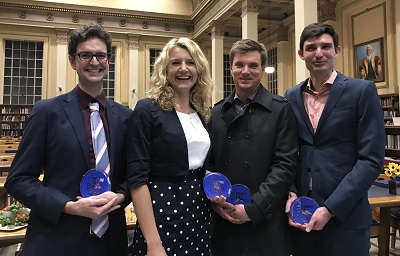Uni researchers lead the way in Tall Poppy awards
Tuesday, 31 July 2018
 Four University of Adelaide researchers have won 2018 South Australian Young Tall Poppy Science Awards, presented at an award ceremony at the University of Adelaide last night.
Four University of Adelaide researchers have won 2018 South Australian Young Tall Poppy Science Awards, presented at an award ceremony at the University of Adelaide last night.
The Tall Poppy Awards, an initiative of the Australian Institute of Policy and Science, recognise young Australians producing world-class scientific research of significant benefit to society, who also demonstrate great leadership potential.
The University’s winners have made their mark in research including the treatment of infections with antibiotic-resistant bacteria, the development of solar cells that are more flexible and transparent, the development of mathematical tools to understand how ideas spread on social media, and using quantum computer technology to improve the security of information online.
The University of Adelaide’s 2018 Young Tall Poppy Science Award winners are:
Dr Lewis Mitchell (Lecturer in Applied Mathematics, School of Mathematical Sciences). Dr Mitchell’s research involves developing mathematical and statistical tools to monitor trends in online social media and to model the spread of ideas over social networks. His work is helping governments, businesses and individuals make sense of the online world.
Dr Mitchell actively communicates his passion for science through regular science outreach events, media interviews, Fresh Science, and the AMSI CHOOSEMATHS mentorship program.
Dr Katharina Richter (Early Career Researcher, Basil Hetzel Institute for Translational Health Research and the Queen Elizabeth Hospital, Adelaide Medical School). Dr Richter has developed two treatments for antibiotic-resistant infections, specifically for recalcitrant chronic sinus infections, and translated both treatments to pilot studies in humans.
Dr Richter is an enthusiastic ambassador for science in the public sphere as a regular presenter at Science Alive!, a participant in outreach activities at schools, and an organiser of the South Australian Pint of Science festival.
Dr Cameron Shearer (Research Fellow, School of Physical Sciences). Dr Shearer’s research with Flinders University in modifying carbon nanotubes to make solar cells more flexible and transparent, could facilitate solar cell use in more domestic and industrial locations.
Since joining the University of Adelaide earlier this year, Dr Shearer is working on new materials which use sunlight to convert water into hydrogen, another clean and renewable fuel source which could replace petrol and gas.
Dr Shearer communicates his research on a fortnightly science podcast Publish, Perish, or Podcast, and has been published in The Conversation and appeared on the children’s science show, Scope.
Dr Benjamin Sparkes (Australian Research Council’s Discovery Early Career Researcher Award Fellow, School of Physical Sciences, Faculty of Sciences). Dr Sparkes is developing a device that can extend the maximum distance of quantum cryptography, which will boost the security of communications for government, business and the broader community.
Dr Sparkes is passionate advocate for physics, participating in outreach work including school visits, lab tours, science festivals, social media and community presentations.
The 2018 South Australian Young Tall Poppy of the Year will be announced at the 2018 SA Science Excellence Awards on 10 August, in the lead up to National Science Week (11-19 August).
Pictured above at the awards night at the University of Adelaide's Barr Smith Library are (l-r): Dr Mitchell, Dr Richter, Dr Shearer and Dr Sparkes.
Contact details
Email: k.brown@adelaide.edu.au
Communications Coordinator
External Relations
The University of Adelaide
Business: +61 (8) 8313 3943







